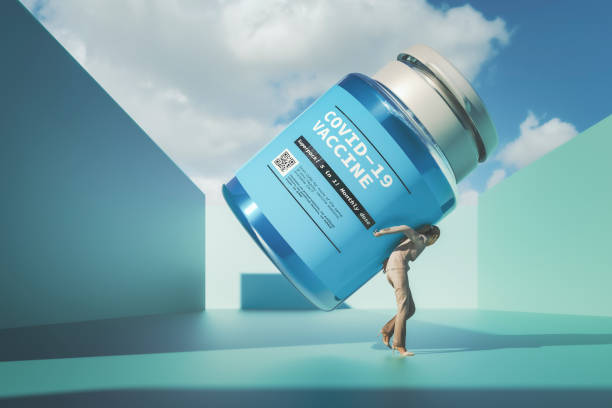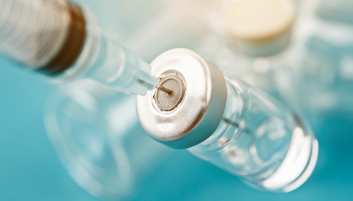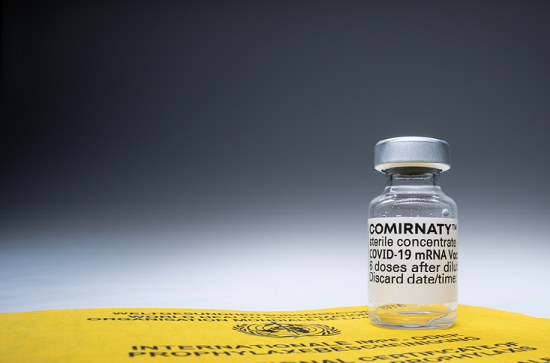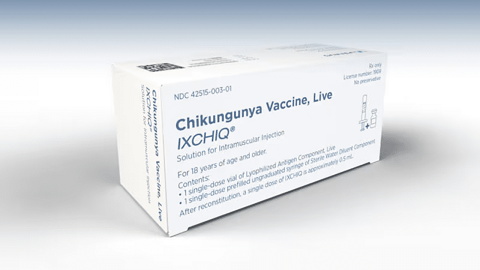Imagine waking up one morning during the COVID-19 pandemic, eager to resume life as normal, and you decide to get the COVID-19 injection at your local pharmacy. In the name of “trusting the science,” you follow government guidelines and roll up your sleeve.
But what happens when things go wrong? What happens if you’re suddenly left with a life-altering debilitating injury that’s far worse than the illness you were told the vaccine was supposed to prevent? What happens if you can no longer walk or talk—or you’re stripped of your independence?
This is not a hypothetical for Donna Noto Diaz, who experienced a stroke shortly after receiving Moderna’s COVID-19 vaccine. When she and her husband sought justice, they found themselves up against a wall, courtesy of a powerful legal shield known as the PREP Act, or Public Readiness and Emergency Preparedness Act.1
A federal court ruled on Sept. 25, 2024 that Ms. Diaz could not sue Moderna for her injuries. The PREP Act bars claims against vaccine manufacturers for bodily harm arising from COVID-19 vaccines, Judge Kymberly K. Evanson said in a ruling2 dismissing the case.
According to the lawsuit, Ms. Diaz suffered a major stroke caused by blood clots just five days after receiving Moderna’s COVID-19 vaccine at a Safeway pharmacy. Her life was irrevocably changed—she now struggles with walking, sitting, and other basic functions, while her husband, Wayne Diaz, has become her full-time caretaker.
Seeking justice, they filed a lawsuit on Mar. 6, 2024, against Moderna citing strict liability, negligence, and breach of implied warranty. However, the PREP Act provides “broad immunity” to vaccine makers for claims arising from the harm caused by their products unless “willful fraud” can be proven.
This case is not unique. Thousands who have suffered adverse reactions3 after receiving a COVID-19 vaccine find themselves in a similar situation, blocked from seeking legal recourse4 due to the PREP Act. The scope and impact of this legal shield are far-reaching, raising a critical question: How did a system designed to address public health emergencies become a barrier to justice for those harmed?
To understand this, we need to explore the origins of the PREP Act and how it was wielded during the COVID-19 pandemic to protect pharmaceutical companies and the government’s chosen “medical countermeasures.”
PREP Act Shielded Vaccine Makers and Pushed Financially Driven Treatment Protocols
The PREP Act5 was passed in 2005 under President George W. Bush in response to concerns over potential bioterrorism and pandemics. The goal was simple: ensure a rapid, unencumbered response to public health emergencies by protecting those involved in developing, manufacturing, and administering medical countermeasures.
Under this law, the U.S. Department of Health and Human Services (HHS) could issue declarations granting sweeping immunity from lawsuits to pharmaceutical companies, hospitals, healthcare professionals, and other entities involved in distributing and administering these countermeasures.
Fast forward to March 2020. Amid the global COVID-19 pandemic, HHS quickly invoked the PREP Act to shield a wide range of COVID-19 countermeasures, including vaccines, treatments like Paxlovid, molnupiravir, and Remdesivir, face masks, diagnostic tests, and medical equipment like ventilators. This move protected pharmacies, hospitals, and healthcare providers, even when administering experimental or risky treatments, from lawsuits related to their use.
However, the PREP Act’s liability shield was only part of the equation. The U.S. government introduced federal financial incentives5 encouraging hospitals to use specific treatments, often over alternatives that might have been in patients’ best interests. With legal protection and the promise of higher reimbursements, hospitals and healthcare providers were placed in a position where following federally endorsed protocols became financially advantageous—regardless of the potential risks to patients.
Government Financially Incentivized Hospitals to Use Remdesivir
One clear example of this is the use of Remdesivir. As part of the federal response to COVID-19, the government financially incentivized hospitals to use Remdesivir through federal funding mechanisms and Medicare policies over less expensive and more effective treatments.
- CARES Act Funding: Under the Coronavirus Aid, Relief, and Economic Security (CARES) Act,6 hospitals treating COVID-19 patients received a 20% add-on payment for Medicare patients diagnosed with the virus. This increase in reimbursement created a financial incentive not only to identify more patients as having COVID-19 but also to adopt specific treatments, like Remdesivir, which was included in the government’s COVID-19 treatment guidelines.
- Increased Reimbursement for Remdesivir: The federal government quickly endorsed Remdesivir as one of the FDA-approved treatments for COVID-19. As a result, hospitals received increased Medicare payments when they treated patients with this drug, making it an appealing option even though Remdesivir had known side effects, such as kidney problems, liver toxicity, and cardiovascular issues. The PREP Act ensured that hospitals and healthcare providers administering Remdesivir were shielded from liability, allowing them to use this costly treatment without fear of lawsuits—even in cases where it may not have been the most appropriate or safe choice.
- Federal Guidelines and Pressure: Remdesivir was widely recommended for hospitalized patients with moderate to severe COVID-19, making it the go-to treatment in many healthcare settings. This recommendation was reinforced by federal guidelines and hospital protocols that emphasized its use, leading to its widespread adoption despite reports of serious health harms and the availability of more affordable and potentially safer alternatives.
The combination of financial incentives and liability protections provided by the PREP Act encouraged hospitals to prioritize treatments like Remdesivir. This created a scenario where experimental or potentially harmful treatments were prioritized because they were more financially rewarding and legally safe rather than being in the best interest of patients.
Government Financially Incentivized COVID-19 Vaccination
The story doesn’t end with Remdesivir. The federal government also incentivized the administration of COVID-19 vaccines:
- Medicare Reimbursements for Vaccines: The Centers for Medicare & Medicaid Services (CMS) set specific reimbursement rates for administering COVID-19 vaccines. Initially, healthcare providers were reimbursed around $28 per dose, but this rate was later increased to $40 per dose. This payment applied to each dose in a multi-dose series, offering a financial reward for completing the full vaccination regimen (e.g., both doses of Pfizer or Moderna vaccines). The increase in reimbursement rates incentivized healthcare providers to prioritize the administration of COVID-19 vaccines.
- Free Vaccine Supply: The U.S. government purchased vaccines from manufacturers like Pfizer and Moderna and distributed them to hospitals at no cost, allowing healthcare providers to bill insurance programs or federal agencies for the administration fee. This structure created a financially risk-free environment for hospitals to promote and administer vaccines en masse while enjoying full liability protections under the PREP Act.
Prioritizing Profits Over Patient Safety
By coupling federal financial incentives with liability protections, the PREP Act created an environment where healthcare providers and hospitals were nudged to follow government-backed treatment protocols, often at the expense of patient care. In the case of Remdesivir, hospitals found themselves financially rewarded for using a drug with known severe side effects while simultaneously being shielded from legal repercussions if patients were harmed.
Similarly, the financial incentives for COVID-19 vaccine administration encouraged rapid and widespread vaccination efforts, regardless of individual patient risk factors—enabling a system where profit-driven healthcare decisions were safeguarded by law, leaving injured patients without recourse and pharmaceutical companies free from accountability.
This raises critical ethical and legal questions: What happens when the priority shifts from patient care to following government-backed protocols for financial gain? And why should companies like Pfizer and Moderna continue to benefit from these protections long after the initial emergency has ended?
U.S. Government’s Flawed Compensation System
While the PREP Act provides blanket legal immunity to pharmaceutical companies, hospitals, and healthcare providers, it also established a narrow pathway for compensation through the Countermeasures Injury Compensation Program (CICP).7
By creating a compensation system that is nearly impossible for most injured individuals to navigate, the federal government further reinforced an environment where pharmaceutical companies are insulated from accountability, and patients are left to fend for themselves.
The PREP Act, designed originally to promote swift responses to public health emergencies, has morphed into a protective shield for pharmaceutical giants like Pfizer and Moderna, enabling them to operate without the typical checks and balances of liability. Meanwhile, the CICP—the sole avenue for those harmed by these countermeasures—offers little hope for justice or support.
The CICP, unlike the National Vaccine Injury Compensation Program,8 is far less known and much more restrictive. It covers only countermeasures specifically designated under the PREP Act, including COVID-19 vaccines and treatments like Remdesivir. To be compensated by the CICP9 for a COVID-19 vaccine injury, it must be established, by “compelling, reliable, valid, medical and scientific evidence,” that the vaccine directly caused the injury or death.
Here’s where the imbalance becomes evident:
- Limited Compensation: The CICP only covers specific expenses related to a covered injury, such as unreimbursed medical expenses and lost wages. However, it does not compensate for pain, suffering, or long-term disability, leaving many victims without sufficient support.
- Strict Filing Requirements: Claimants must file their petitions within one year of receiving the countermeasure. Given the ongoing nature of many vaccine injuries, this short window significantly limits the number of individuals who can successfully apply for compensation.
- Lack of Due Process: Unlike traditional court proceedings where claimants have the right to present evidence, call witnesses, and cross-examine the opposing party, the CICP operates as a closed administrative process. Decisions are made solely by personnel within HHS. This raises serious concerns about impartiality and transparency, as the agency in charge of approving compensation is the very one that endorsed and promoted the countermeasures. There is no opportunity for judicial review or an appeals process, which strips injured individuals of the due process rights they would typically have in the court system.
- Low Payout Rate: Since its inception, the CICP has had a history of denying the vast majority of claims. As of Sep. 1, 2024, 13,392 claims have been filed with the CICP alleging injuries from COVID-19 countermeasures. Of those, only 3,260 have received decisions, while 10,132 are pending review. Of the 3,260 decisions, only 58 claims were deemed eligible for compensation. Of the 58 claims, only 16 have received compensation. This starkly contrasts with the PREP Act’s broad liability shields for manufacturers and healthcare providers, leaving injured patients with little recourse.
According to the most recent data10 from the Vaccine Adverse Event Reporting System (VAERS), the primary government-funded system for reporting adverse vaccine reactions in the U.S., there have been 1,646,001 reported injuries following COVID-19 vaccination, including 37,390 deaths11 reported as of Aug. 30, 2024. The low number of applicants to the CICP fund for injuries or death from COVID-19 vaccines suggests people don’t know the program exists.
This situation paints a stark picture of the imbalance between corporate protections and patient rights. While companies benefit from federal immunity and financial incentives, patients bear the full brunt of potential adverse effects with virtually no recourse. The government’s dual strategy of protecting pharmaceutical companies while creating insurmountable hurdles for the injured has not only prioritized profits over safety but has also eroded public trust in healthcare systems and governmental oversight.
A Call for Reform
To restore balance, there needs to be an urgent reevaluation of the PREP Act’s scope and the circumstances under which its protections are granted. One potential approach is to completely remove liability protections for pharmaceutical companies, putting them on the same footing as manufacturers of other drugs and treatments. By holding vaccine makers and pharmaceutical companies accountable in the same way as other drug manufacturers, it would incentivize higher standards of safety, transparency, and ethical practices.
Patients injured by these products would then have access to the full range of safeguards offered by the U.S. legal system, including the courts, ensuring they receive a fair chance at justice and compensation.
If any protections are to remain, they must be accompanied by robust, accessible compensation mechanisms for those harmed. The CICP requires a complete overhaul—extending the filing period, expanding the types of compensation available, and providing an appeals process for rejected claims. Additionally, a transparent system that allows for independent review of adverse events would introduce the accountability currently missing in this equation.
Furthermore, if the emergency has officially ended, pharmaceutical companies should no longer enjoy carte blanche immunity under the PREP Act. Once the emergency is over, normal regulatory and legal standards should apply, ensuring companies can be held accountable for their products. This change would prevent pharmaceutical companies from operating without oversight or consequence long after the circumstances that initially warranted their protections have passed.
In the end, the priority must shift back to patient care and informed consent. Public health measures should not come at the expense of individual rights and well-being. Only with these changes can we begin to rebuild a healthcare system that places patients, not financial interests, at its core and ensures a clear, just path to compensation when harm occurs.
If you would like to receive an e-mail notice of the most recent articles published in The Vaccine Reaction each week, click here.
This article was originally published on Substack. Megan Redshaw is an attorney and journalist with additional expertise in natural health. She has a flare for breaking down complex and controversial topics into easy-to-synthesize and entertaining pieces that empower others to make informed.
Click here to view References:1 U.S. Department of Health and Human Services. Public Readiness and Emergency Preparedness (PREP) Act.
2 Court Opinions. Diaz v. Moderna US Inc., No. C24-0986-KKE, 2024 BL 331930 (W.D. Wash. Sept. 20, 2024), Court Opinion. Bloomberg Law.
3 MedAlerts. Found 1,648,532 cases where Vaccine is COVID19 or COVID19-2. National Vaccine Information Center.
4 U.S. Health Resources & Services Administration. Countermeasures Injury Compensation Program (CICP) Data. Sept. 1, 2024.
5 TAGGS. HHS Provider Relief Fund.
6 Congress.gov. S.3548 – CARES Act.
7 HRSA. Countermeasures Injury Compensation Program (CICP).
8 HRSA. National Vaccine Injury Compensation Program.
9 Redshaw M. 21-Year-Old Med Student Severely Injured by Pfizer Vaccine Still Waiting for Response From Government Compensation Program. The Defender Feb. 25, 2022.
10 MedAlerts. Found 1,648,532 cases where Vaccine is COVID19 or COVID19-2. National Vaccine Information Center.
11 MedAlerts. Found 37,442 cases where Vaccine is COVID19 and Patient Died. National Vaccine Information Center.













3 Responses
Article quote: With legal protection and the promise of higher reimbursements, hospitals and healthcare providers were placed in a position where following federally endorsed protocols became financially advantageous—regardless of the potential risks to patients.
/ End quote.
Whom in their right mind wants to put the government in control of their lives? Whenever a government is involved, someone else steps forward to take advantage and grift the system. Where did the government bureaucrats get all that money to mis manage in the first place? We all have lived lifetimes subjected to the yolk of taxation without representation. In a free market setting would the people have opened up their wallets to voluntarily pay premium costs only to be treated this way?
This is what happens when people are over taxed and over burdened by a government which never stops growing. A government which never ceases their ongoing wealth redistribution, handing out special insider favors. The prep act. The 1986 act. The ongoing wars. The wealth distribution gap between rich and poor. The devalued dollar which primarily benefits first receivers of the money. Failed educational models. Outrageously controversial social issues fueled by subsidized special interest groups. The inability and outright refusal to recognize any shortcoming if that goes against the interests of those with connections within government.
No matter how well thought out or well implemented, there is no long term workable solution to correcting government policy as long as there is no free market for the people to decide. Our personal choice spending in a free market is our most important vote. When the bureaucrats are in control, the people have no voice, because we lose control of how our own money is spent. We are left with nothing more then a tax, awaiting the next edict from the emperor.
Keep voting yes for bigger government. Vote yes on a little bit more tax here, another seemingly inconsequential rule there, a touch of welfare, a touch of subsidy. You’re not personally paying for that right? The people are not unwittingly rescinding their own right to choose what happens to them at hospitals or schools when they vote yes on seemingly unrelated issues are they?
Keep on expanding the power of the bureaucratic state. Then sit back and watch a similar incompetent misdirected management issue happen again and again in every single sector the government touches. The bureaucrats do so good with everything else, let’s give them even more responsibility and control. People must appreciate the government now playing the role of their own private doctor. How else can one explain the peoples continued acceptance of growing government? Why else would they continue to vote yes on government expansion, continued subsidies, continued tax, if they did not implicitly trust their own government? Your tax dollars hard at work.
We need to hold companies responsible for products that end up harming consumers. Drugs with known side effects must be clearly defined and consumers must have freedom to decide whether or not to take them. No drug is a panacea and one size does not fit all. Exemptions must be honored.
The only solution is to arouse the masses from their slumber, liberate them from the prison of propaganda, and refuse all vaccines. The system will grind to a halt.